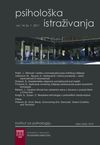Dva određenja pojmovne promene - teorija koherencije i teorija elemenata
Two Perspectives on Conceptual Change: The Coherence Theory and the Theory of Elements
Author(s): Vesna PetrovićSubject(s): Education, Psychology
Published by: Филозофски факултет, Универзитет у Београду
Keywords: conceptual change; naïve knowledge; mental models; p-prims; scientific knowledge;
Summary/Abstract: In constructivist psychology, the conceptual change phenomena are researched and interpreted within two prominent but competing theoretical perspectives – the ‘knowledge-as-theory’ viewpoint (Vosniadou, Chi), and the ‘knowledge-as-elements’ viewpoint (diSessa). This paper discusses the similarities and differences between these two viewpoints in terms of their basic theoretical ideas and empirical data. The common baseline for both standpoints is the idea of an existing naïve knowledge and the idea of the student actively constructing his/her knowledge. The key question where these two dominant viewpoints part ways is the question of naïve knowledge organization and nature: is previous knowledge organized as a uniform framework and a coherent theory-like system, or as the set of mutually independent elements of knowledge? The concluding part discusses educational implications of the two viewpoints and the possible solutions to their theoretical conflict. The final assessment is that at this moment neither of these theories provides a complete answer to the question of the conceptual change mechanism.
Journal: Psihološka istraživanja
- Issue Year: 16/2013
- Issue No: 1
- Page Range: 29-55
- Page Count: 27
- Language: Serbian

